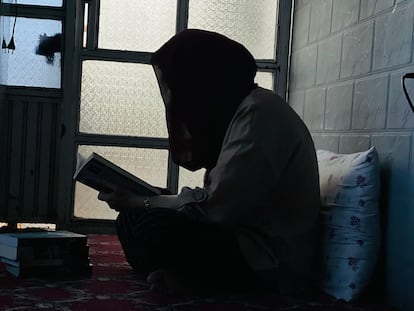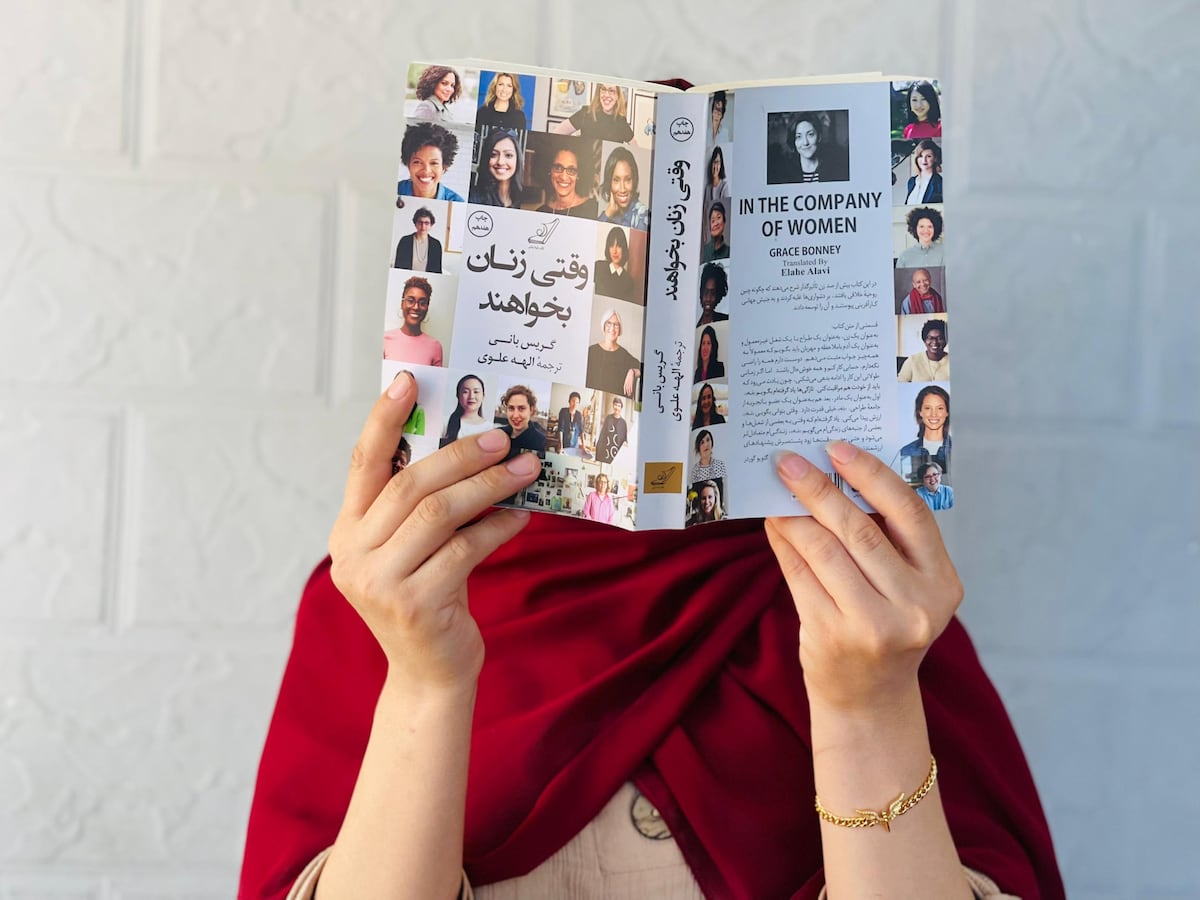On the afternoon of August 15, 2021, Fahr was arranging books on the shelves of her women’s library in Kabul when the Taliban swept into the city. The day would mark the beginning of what the United Nations calls “the most restrictive country in the world for women’s rights.”
The 29-year-old law graduate, who uses the pseudonym Fahr Parsi for her safety, watched her dreams crumble within hours. The library she had founded with university classmates in 2019 would have to close—a space that had once buzzed with women’s voices discussing literature, law, and their aspirations.
With the fall of the capital after 20 years of US-backed Afghan government rule, the systematic restrictions on women’s education, work and public spaces returned in full force.
Fahr, whose real name is concealed for her safety, hastily sold chairs and shelves, along with her friends, to pay the remaining rent. The collection of 4,000 books was moved under the cover of darkness to a secret location in Kabul, away from Taliban scrutiny.
Since retaking power, the Taliban have systematically erased women from public life with unprecedented speed and scope. According to Human Rights Watch, girls are banned from attending school above grade 6, while universities have been closed to women entirely—including medical training programs. Those found to read books or secretly educate themselves face persecution and physical beating, and their families risk punishments.
Fahr was among those who refused to give in. Along with several other women, she took to the streets of Kabul in protest against the Taliban’s restrictions on women’s education, work and public freedoms. Two of her friends were arrested on site and later tortured in prison, she says.
Upon returning home, her family urged her to abandon her activism. Her parents’ warning carried the weight of a society where family honor could be destroyed by association with dissent: “If you are imprisoned, it can risk your safety and ruin our reputation among people.”
Most jobs, public parks, gyms, libraries and cafes are now forbidden to women. Traveling without a mahram (a close male relative such as a husband or brother) is prohibited, and in the latest decree, women are banned from speaking loudly in public or even at home.
Dozens of women who defied these rules through protests or public questioning have been detained, with many reporting torture and sexual abuse in Taliban prisons, according to reports by BBC and other international outlets.
Books themselves have become targets in this ideological war. The Taliban have collected volumes from public libraries in Herat and Kabul, particularly those by Afghan and foreign authors whose contents conflict with Taliban ideology.
Zalmai Forotan, the Taliban’s inspector for libraries, told BBC Persian in November 2024 that books containing “ideologically or religiously disputed topics” or featuring images of living beings would be inspected and confiscated—a process that has left library shelves increasingly bare.
The Taliban initially called restrictions on women’s education and freedoms temporary, promising to reverse them once a proper Islamic climate was established. Instead, they have implemented increasingly severe limitations with methodical precision. Public spaces have shrunk dramatically for Afghan women, who now navigate a maze of prohibitions that govern everything from their footsteps to their voices.
Networks of resistance
Even as the Taliban tightened their grip on women’s spaces, some women created workarounds to educate each other and quietly defy the regime. Fahr is among them. After her public protests were silenced and the library closed, she moved online with a close friend to establish a secure book club on WhatsApp and Telegram—transforming her physical library into a digital network of resistance.
“Initially nearly 300 women joined our WhatsApp group, where I provide scanned PDFs of the stored books,” she explains. “Sometimes I deliver printed books to members as loans, if I trust them completely.”
Each member shares observations about books with photos after finishing them. But the operation requires extreme caution in a climate where trust has become a luxury few can afford.
“We hold secret reading sessions only with a few members we trust completely,” Fahr adds. “We fear the Taliban may have spies among us. Also, some women are afraid to come out for in-person sessions, fearing detention by Taliban intelligence.”
She personally vets every new member before adding them to the WhatsApp group and asks members not to discuss political topics, fearing Taliban surveillance. Keeping the books themselves poses constant danger.
The Taliban have conducted door-to-door searches for anti-Taliban groups like the National Resistance Front (NRF) and ISIS-K in several Kabul neighborhoods, forcing Fahr to hide her collection like contraband.
“It’s even a threat to keep these banned books,” she says.
Despite the risks, demand for books—especially novels and motivational texts—is increasing. Fahr believes women are seeking inspiration as they face an uncertain future with diminishing hope, turning to literature as both escape and sustenance.
 Afghan women resort to reading in secret, risking severe punishment if discovered by the Taliban. In this image, taken in June 2025, the leader of the women’s reading club, Fahr Parsi (not her real name), reads a book.Fahr Parsi
Afghan women resort to reading in secret, risking severe punishment if discovered by the Taliban. In this image, taken in June 2025, the leader of the women’s reading club, Fahr Parsi (not her real name), reads a book.Fahr Parsi
One book the group recently read is “Sinuhe, The Egyptian,” a novel exploring themes of suppression, using women as tools, loss of identity, and the power of knowledge.
Fahima, 18, who asks to be identified by her first name only, joined the club shortly after her 10th-grade midterm exams were canceled due to the education ban.
“I dreamed of becoming a doctor. Unfortunately, I wasn’t able to achieve it, and it’s now been almost four years since I’ve been away from my studies,” she says.
She has read 35 books through the club, inspiring her to write The Path of Light, an account of an Afghan girl’s life under Taliban rule. She hopes to tell future generations what her generation lost.
Marjan, another participant in her twenties, has read 15 books since joining last year. She was a 12th-grade student preparing for the Kankor exam (Afghanistan’s nationwide university entrance exam) to become a lawyer when the Taliban banned her from school four years ago.
“This is what makes me feel proud and motivated to keep this book club going, no matter what,” Fahr explains.
Support from exile
While Fahr takes risks inside Afghanistan, other Afghan women in exile have built networks to support girls who remain in the country. In Germany, the activist Maryam Amwaj facilitates a Telegram group with other women from European countries, running reading circles for girls in western Afghanistan.
Together they select books spanning social science, novels, and Islamic texts in PDF format, agreeing to read designated pages before sharing reflections.
“It is the least we can do for our sisters inside the country to fight against the darkness that is only increasing,” Amwaj says.
Shahrbanu Haidari, an exiled Afghan women’s rights advocate and researcher based in the UK, describes these book clubs as one of many forms of resistance emerging across Afghanistan.
“Afghan women haven’t given up—only the form of their resistance has changed,” she says. “If you don’t see girls on the streets of Kabul protesting, it doesn’t mean they’ve stopped. It means the Taliban crackdown has intensified, and women have adapted.”
The dynamic shifted after reports of violence and sexual abuse of women protesters in Taliban prisons became widespread. Haidari stresses that secret book clubs and education circles are spreading among women throughout Afghanistan.
“This is a form of conscious resistance against the Taliban’s efforts to Talibanize the minds of Afghan girls—a battle of books and ideas.”
The Taliban have not stepped back from their policies against women or reversed any restrictions. The international community has largely shifted focus to other global crises, leaving Afghan women increasingly isolated.
But Fahr hasn’t given up.
“I will keep this going, until the day comes when we can read again freely and I can reopen my library for girls again.”
This article was published in partnership with Egab, a platform that works with journalists from the Middle East and Africa.
Sign up for our weekly newsletter to get more English-language news coverage from EL PAÍS USA Edition

